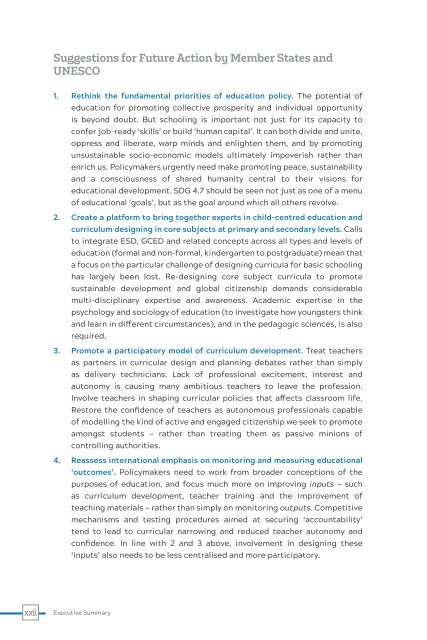Rethinking Schooling for the 21st Century
UNESCO MGIEP officially launched 'Rethinking Schooling for the 21st Century: The State of Education, Peace and Sustainable Development and Global Citizenship' in 2017 at the UNESCO General Conference. This study analyses how far the ideals of SDG 4.7 are embodied in policies and curricula across 22 Asian countries and establishes benchmarks against which future progress can be assessed. It also argues forcefully that we must redefine the purposes of schooling, addressing the fundamental challenges to efforts to promote peace, sustainability and global citizenship through education.
UNESCO MGIEP officially launched 'Rethinking Schooling for the 21st Century: The State of Education, Peace and Sustainable Development and Global Citizenship' in 2017 at the UNESCO General Conference. This study analyses how far the ideals of SDG 4.7 are embodied in policies and curricula across 22 Asian countries and establishes benchmarks against which future progress can be assessed. It also argues forcefully that we must redefine the purposes of schooling, addressing the fundamental challenges to efforts to promote peace, sustainability and global citizenship through education.
You also want an ePaper? Increase the reach of your titles
YUMPU automatically turns print PDFs into web optimized ePapers that Google loves.
Suggestions <strong>for</strong> Future Action by Member States and<br />
UNESCO<br />
1. Rethink <strong>the</strong> fundamental priorities of education policy. The potential of<br />
education <strong>for</strong> promoting collective prosperity and individual opportunity<br />
is beyond doubt. But schooling is important not just <strong>for</strong> its capacity to<br />
confer job-ready ‘skills’ or build ‘human capital’. It can both divide and unite,<br />
oppress and liberate, warp minds and enlighten <strong>the</strong>m, and by promoting<br />
unsustainable socio-economic models ultimately impoverish ra<strong>the</strong>r than<br />
enrich us. Policymakers urgently need make promoting peace, sustainability<br />
and a consciousness of shared humanity central to <strong>the</strong>ir visions <strong>for</strong><br />
educational development. SDG 4.7 should be seen not just as one of a menu<br />
of educational ‘goals’, but as <strong>the</strong> goal around which all o<strong>the</strong>rs revolve.<br />
2. Create a plat<strong>for</strong>m to bring toge<strong>the</strong>r experts in child-centred education and<br />
curriculum designing in core subjects at primary and secondary levels. Calls<br />
to integrate ESD, GCED and related concepts across all types and levels of<br />
education (<strong>for</strong>mal and non-<strong>for</strong>mal, kindergarten to postgraduate) mean that<br />
a focus on <strong>the</strong> particular challenge of designing curricula <strong>for</strong> basic schooling<br />
has largely been lost. Re-designing core subject curricula to promote<br />
sustainable development and global citizenship demands considerable<br />
multi-disciplinary expertise and awareness. Academic expertise in <strong>the</strong><br />
psychology and sociology of education (to investigate how youngsters think<br />
and learn in different circumstances), and in <strong>the</strong> pedagogic sciences, is also<br />
required.<br />
3. Promote a participatory model of curriculum development. Treat teachers<br />
as partners in curricular design and planning debates ra<strong>the</strong>r than simply<br />
as delivery technicians. Lack of professional excitement, interest and<br />
autonomy is causing many ambitious teachers to leave <strong>the</strong> profession.<br />
Involve teachers in shaping curricular policies that affects classroom life.<br />
Restore <strong>the</strong> confidence of teachers as autonomous professionals capable<br />
of modelling <strong>the</strong> kind of active and engaged citizenship we seek to promote<br />
amongst students — ra<strong>the</strong>r than treating <strong>the</strong>m as passive minions of<br />
controlling authorities.<br />
4. Reassess international emphasis on monitoring and measuring educational<br />
‘outcomes’. Policymakers need to work from broader conceptions of <strong>the</strong><br />
purposes of education, and focus much more on improving inputs — such<br />
as curriculum development, teacher training and <strong>the</strong> improvement of<br />
teaching materials — ra<strong>the</strong>r than simply on monitoring outputs. Competitive<br />
mechanisms and testing procedures aimed at securing ‘accountability’<br />
tend to lead to curricular narrowing and reduced teacher autonomy and<br />
confidence. In line with 2 and 3 above, involvement in designing <strong>the</strong>se<br />
‘inputs’ also needs to be less centralised and more participatory.<br />
xxii<br />
Executive Summary

















